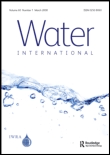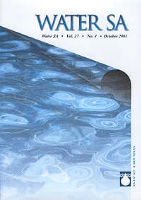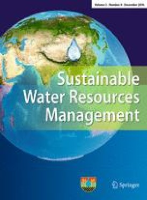
WATER INTERNATIONAL
Scope & Guideline
Fostering Interdisciplinary Dialogues on Water Sustainability
Introduction
Aims and Scopes
- Integrated Water Resources Management (IWRM):
The journal focuses on IWRM as a holistic approach that considers the interconnectedness of water, land, and ecosystems, promoting sustainable management of water resources. - Transboundary Water Governance:
Research exploring the complexities of managing shared water resources, including legal, political, and social dimensions, is a core area of interest, addressing conflicts and cooperation among nations. - Water Security and Climate Change:
Papers often investigate the implications of climate change on water availability and quality, aiming to enhance the resilience of water systems in the face of environmental changes. - Water and Socioeconomic Dynamics:
The journal emphasizes the relationship between water resources and socio-economic factors, including issues of equity, access, and the impact of water management on community livelihoods. - Innovative Water Technologies and Practices:
Research reflects on technological advancements and innovative practices in water management, promoting efficiency and sustainability in urban and rural contexts. - Community Engagement and Governance:
The journal values the role of local communities in water governance, highlighting participatory approaches and the importance of local knowledge in decision-making processes.
Trending and Emerging
- Psychosocial Factors in Water Management:
Recent studies are increasingly exploring the emotional and psychological aspects of water governance, emphasizing the importance of communication strategies in promoting sustainable water practices. - Climate Resilience and Adaptation Strategies:
There is a growing focus on developing climate-resilient water management strategies, with research addressing adaptive measures to cope with the impacts of climate change on water resources. - Sustainable Urban Water Management:
Emerging themes highlight the need for sustainable practices in urban water management, addressing challenges related to urbanization, infrastructure, and community engagement. - Water-Energy-Food Nexus:
Research is increasingly examining the interconnections between water, energy, and food systems, promoting integrated approaches that enhance sustainability across these sectors. - Innovative Governance Models:
The journal is seeing a rise in studies that propose new governance models, including participatory and decentralized approaches, that aim to enhance stakeholder involvement and accountability in water management.
Declining or Waning
- Traditional Water Management Practices:
There appears to be a waning interest in traditional methods of water management, as the discourse shifts towards innovative and technology-driven solutions that address contemporary challenges. - Water Wars and Conflict Narratives:
The focus on water wars as a predominant theme in water governance discussions has diminished, giving way to more collaborative and cooperative frameworks for transboundary water management. - Single-Dimensional Approaches to Water Issues:
The journal's recent publications reflect a move away from isolated studies on specific water issues, favoring integrated approaches that consider multiple dimensions, such as social, economic, and environmental factors. - Over-Emphasis on Quantitative Assessments:
There is a noticeable reduction in purely quantitative assessments of water resources, as qualitative research and interdisciplinary methodologies gain traction, emphasizing the complexity of water issues.
Similar Journals

JOURNAL OF THE AMERICAN WATER RESOURCES ASSOCIATION
Advancing water resource management through innovative research.The JOURNAL OF THE AMERICAN WATER RESOURCES ASSOCIATION, published by Wiley, is a premier platform dedicated to advancing the field of water resource management and research. With an ISSN of 1093-474X and an impressive Q1 ranking in multiple categories, including Earth-Surface Processes, Ecology, and Water Science and Technology, this journal serves as a vital resource for professionals, researchers, and students alike. Established in 1967 and set to converge through 2024, it has consistently published cutting-edge research that influences policy and practice in water resource management. The journal's open access option enhances its reach, ensuring that critical findings are accessible to a wider audience. The Scopus rankings further underscore its impact, placing it in the top quartile within its fields, highlighting its importance in shaping scholarly discourse. As a significant contributor to the understanding and management of freshwater systems, the journal offers a crucial means for sharing insights and fostering collaboration in the vital realm of water resources.

Water Conservation Science and Engineering
Exploring Interdisciplinary Approaches to Water ManagementWater Conservation Science and Engineering, published by SPRINGERNATURE, is a vital academic journal dedicated to advancing the fields of environmental engineering, ocean engineering, waste management, and water science and technology. Since its inception in 2016, the journal has quickly established itself within the academic community, achieving a commendable Q3 ranking across multiple categories in 2023. With an ISSN of 2366-3340 and an E-ISSN of 2364-5687, it is accessible to a global readership eager to explore the latest research and innovations in water conservation and sustainable practices. Although currently not open access, the journal is committed to publishing high-quality scholarly articles that provide insights into effective water management strategies, innovative engineering solutions, and the critical importance of preserving our water resources. Based in Singapore, Water Conservation Science and Engineering aims to foster interdisciplinary collaboration among researchers, professionals, and students, making it an essential resource for anyone passionate about environmental sustainability and preservation.

WATER SA
Advancing water science for a sustainable future.WATER SA, published by the WATER RESEARCH COMMISSION, serves as a pivotal platform for interdisciplinary research in the areas of water science and technology. With an ISSN of 0378-4738 and an E-ISSN of 1816-7950, this open-access journal has been committed to disseminating knowledge since 2005, ensuring that research is freely accessible to a global audience. As of 2023, it holds a Q3 ranking in several key categories including Applied Microbiology and Biotechnology, Management, Monitoring, Policy and Law, Waste Management and Disposal, and Water Science and Technology. These rankings reflect its significant contribution to these disciplines, particularly in South Africa where it is based. With a history dating back to 1976 and converging research efforts extending through 2024, WATER SA aims to illuminate pressing water-related challenges and foster innovative solutions through rigorous scientific inquiry. Researchers, professionals, and students interested in the sustainability and management of water resources will find its comprehensive portfolio essential for advancing their work and understanding in an increasingly critical field.

Water Alternatives-An Interdisciplinary Journal on Water Politics and Development
Connecting Scholars to Influence Water Politics WorldwideWater Alternatives is a leading open-access journal dedicated to the interdisciplinary exploration of water politics and development, published by the WATER ALTERNATIVES ASSOCIATION since 2008. Hailing from France, this journal provides a crucial platform for scholars and practitioners to engage with innovative research that spans critical areas including geography, planning, political science, and water science. With commendable rankings in multiple fields—Q1 in Geography, Planning and Development, and a strong position in Political Science and International Relations—the journal has established itself as an essential resource for advancing knowledge and policy formulation regarding water issues globally. The open-access model ensures that research findings are widely disseminated and accessible, enhancing visibility and impact in the academic community. Researchers and students alike will find Water Alternatives indispensable for fostering dialogue around sustainable water management and political frameworks that shape water governance.

Water Economics and Policy
Navigating the Complexities of Water Economics and GovernanceWater Economics and Policy is a leading academic journal specializing in the interdisciplinary examination of water-related economic issues and policy frameworks. Published by WORLD SCIENTIFIC PUBL CO PTE LTD in Singapore, this journal serves as a pivotal platform for sharing innovative research, empirical studies, and theoretical developments that address the complex interactions between water resources management, economic sustainability, and policy formulation. With its impact factor reflecting its growing influence in the field, Water Economics and Policy is indexed in several key categories, ranking in the third quartile in areas such as Business and International Management, Economics and Econometrics, and Water Science and Technology. Launched in 2015, the journal embraces an open-access approach to enhance the dissemination of knowledge and insights among researchers, policymakers, and practitioners. Its commitment to fostering dialogue on critical water issues makes it an invaluable resource for anyone seeking to advance their understanding of water economics and contribute to the sustainable management of water resources.

Sustainable Water Resources Management
Exploring the nexus of water, energy, and sustainability.Sustainable Water Resources Management is an esteemed journal focusing on the critical field of water resource management in the context of sustainability. Published by Springer International Publishing AG, this journal serves as a vital platform for researchers, policymakers, and practitioners to disseminate cutting-edge research and innovative practices aimed at addressing global water challenges. With an impressive impact factor aligned with its Q2 ranking in Water Science and Technology and Q3 in Renewable Energy, Sustainability, and the Environment, it maintains a robust reputation in its field, evidenced by its Scopus rankings. Covering a diverse range of topics from integrated water resource management to the nexus between water and energy, Sustainable Water Resources Management is committed to fostering knowledge exchange and encouraging interdisciplinary dialogue among its audience. This journal, operating under strict academic rigor, plays an essential role in advancing sustainable practices and is open from 2015 to 2024, making it a relevant resource in today’s rapidly evolving environmental context.

Water Resources and Industry
Pioneering Insights in Water Resources and TechnologyWater Resources and Industry, published by Elsevier, stands at the forefront of research in the critical fields of water science and technology, as well as geography, planning, and development. With an impressive 2023 impact factor that places it in the Q1 category for both Geography and Water Science on a global scale, this journal is a vital resource for academics, professionals, and students seeking to advance their understanding of water-related issues impacting industries worldwide. Since its inception in 2013 as an Open Access journal, it has fostered innovative research and practical solutions to challenges in water resource management. Located in the vibrant academic hub of Amsterdam, the journal encourages submissions that cover a broad spectrum of topics, from sustainable practices and policy development to technological advancements in water treatment and distribution. By making its research publicly accessible, Water Resources and Industry not only contributes to scholarly discourse but also empowers stakeholders to implement evidence-based strategies for water sustainability, thereby enhancing its relevance and impact in today's world.

Frontiers in Water
Innovating for a future with clean and accessible water.Frontiers in Water is a leading open-access journal dedicated to advancing the field of water science and technology. Published by FRONTIERS MEDIA SA in Switzerland, the journal has been a vital resource for researchers and professionals since its inception in 2019. With an impressive Q2 ranking in the Water Science and Technology category for 2023 and a notable position within the Scopus rankings (Rank #113/261), it reflects the growing importance of water issues in a rapidly changing world. The journal provides a platform for groundbreaking research and innovative solutions to the challenges facing water resources globally, ensuring that vital knowledge is accessible to a diverse audience. Researchers are encouraged to engage with its comprehensive articles covering various aspects of water science, including hydrology, pollution control, and sustainable management practices. As an open-access journal, Frontiers in Water enables unrestricted access to its content, fostering collaboration and knowledge-sharing among academics, industry professionals, and policy-makers. Join the movement towards sustainable water management and contribute to this dynamic scientific community.

H2Open Journal
Pioneering open access in water science and technology.H2Open Journal, published by IWA Publishing, is a leading open-access platform established in 2018, dedicated to advancing the field of water science and technology. With its E-ISSN 2616-6518, this journal caters to a global audience, providing essential research insights that span various domains, including environmental science, management, monitoring, policy, law, and water science. The journal has achieved notable recognition in recent years, holding a Q3 ranking in three distinct categories within the 2023 environmental science metrics. Its commitment to open access ensures that valuable research is freely available to researchers, professionals, and students alike, fostering collaboration and innovation in water-related disciplines. With a focused publication strategy spanning from 2018 to 2024, H2Open Journal is poised to be a pivotal resource for addressing critical challenges in water sustainability and management, reflecting the pressing need for informed actions in the face of global water issues.

Hydrologie und Wasserbewirtschaftung
Innovating hydrology for a thriving planet.Hydrologie und Wasserbewirtschaftung, published by the BUNDESANSTALT GEWASSERKUNDE-BFG, stands as a vital open access journal in the field of hydrology and water management since its inception in 1999. Based in Germany, this journal aims to disseminate high-quality research related to water resources, environmental sustainability, and innovative management strategies. Though it has a Q4 ranking in Water Science and Technology for 2023, and holds a Scopus rank of 113 out of 225, the journal provides an essential platform for researchers, professionals, and students interested in advancing their understanding of water science. With coverage spanning from 1999 to 2018 and a seamless move to an open access model, Hydrologie und Wasserbewirtschaftung remains committed to contributing to the ongoing dialogue around critical water issues. Researchers looking to publish their findings or stay abreast of developments in water science will find this journal indispensable.